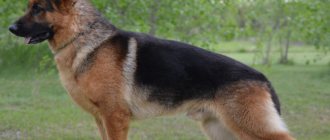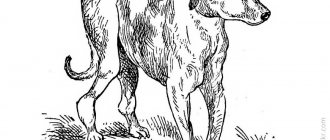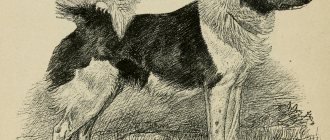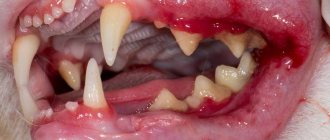The German Shepherd breed is genetically predisposed to a number of diseases. Therefore, when purchasing a German Shepherd puppy, it is better to immediately study all the information about diseases. They can be hereditary or acquired during life.
It is important to study the issue in advance so as not to panic, no matter what the cause of the illness arises. We talked in detail about the German Shepherd breed in this article.
How to determine if a dog is sick, symptoms
Some diseases of shepherd dogs cannot be detected with the naked eye. But there are also quite understandable external signs. If the dog is playful and active, then this is the behavior of a healthy dog. Shiny fur, absence of pus in the eyes and ears are problems that are visible upon visual inspection. Therefore, it is quite easy to notice emerging health problems.
One of the methods for determining health is the nose. It is usually moist and cool to the touch. But a dry, hot nose is not always a sign of malaise. This is how it remains after the animal sleeps or overheats on hot days.
An indicator of a German's health is an excellent appetite. If a dog eats with appetite and eats everything, while defecating regularly, then it is healthy.
Symptoms of the disease in shepherds usually have external manifestations:
- apathy;
- hair loss;
- the presence of bald areas;
- lack of appetite;
- dry nose;
- cloudy eyes;
- pus on the ears.
Often a sick shepherd dog stops responding to its name, preferring to lie lethargically in the far corner. In this case, you need to show the dog to the veterinarian - after all, these are all signals that your pet is unwell.
Many German Shepherd diseases that are not diagnosed in time can be irreversible. Read our article about how and what to feed your German Shepherd correctly.
Learning to determine in advance
Responsibility for the health of the pet lies entirely with the owner. It is not enough to just take care of the dog, you also need to be aware of its health. The Shepherd is a family pet that spends a lot of time with people. A good owner will notice immediately if something is wrong.
The prerequisites for the disease can be determined at a young age, which will help prevent it. If your puppy has vomiting or diarrhea, this is a digestive system disorder. A dog gets food poisoning if it drinks water. Even if a young shepherd is very lethargic after a walk, you should think twice and take your pet to a veterinary hospital.
Preventive measures
Diseases in puppies can be easily prevented by timely vaccinations combined with attentive care. Preventive vaccinations for this breed begin when they reach the age of 2 months.
The vaccination is given only to healthy dogs. Therefore, within two weeks, puppies are checked for worms and given preventive treatment. If a disease is detected during the inspection, then all vaccinations are postponed until the animal has fully recovered.
Primary vaccination is carried out in two stages:
- The injection is administered immediately after reaching 2 months of age.
- The next one is done strictly after the complete replacement of baby teeth.
Revaccination is carried out annually. In this case, female German shepherds are vaccinated 30 days before mating. Several months are added to the period of repeated revaccination if the heat was less than a month ago.
Disease Prevention
German Shepherd diseases and their serious symptoms are preventable. When buying an adult dog, you need to make sure that you have a vaccination certificate. There will be detailed information about the vaccines already given and which ones still need to be done. A young puppy should not be taken outside if it was purchased unvaccinated. You need to get a vaccine, and only after that take your pet for a walk.
It is recommended to record the dog’s medical history in order to correctly diagnose the disease in the future. This will allow you to exclude some diagnoses during testing, starting timely treatment for exactly the disease that was detected.
It is also important to organize proper nutrition.
Main diseases in the German Shepherd
Malaise in shepherd dogs can be roughly divided according to the type of illness. They can be parasitic skin lesions, genetic and viral forms. In addition, the shepherd is susceptible to other diseases.
External parasites
Diseases caused by parasites are common among pets. The German Shepherd was no exception.
Demodicosis
It is a skin disease caused by a group of Demodex parasites, hence the name. The pathology is quite common in German Shepherds. Small ticks begin to eat the skin and fiber immediately after they land on the dog. Therefore, if you notice the fussy behavior of a German trying to shake something off himself, you should immediately show him to the veterinarian.
There are two reasons why parasites appear on a dog. First of all, this is contact with a sick animal, and secondly, insufficient care. Ticks are present in the flora on their own, with virtually no ability to cause disease in a healthy shepherd dog. But as soon as her immune system is weakened, they attack.
Symptoms:
- severe itching (causes the dog to itch);
- areas of redness;
- hair loss.
The severity of the disease and the prevalence of mites in a dog is determined by the number of bald spots. Point location - there are less than 5 such areas, more - this is already an extensive process.
In advanced cases, the temperature drops to 36-37 degrees, the dog becomes apathetic and loses appetite. Treatment is carried out strictly under the supervision of a veterinarian, it is aimed at destroying the tick and restoring the dog’s immunity.
Otodectosis
Otodectosis is another common ailment of the German Shepherd. Mites living in the dog’s ear can cause otitis media. Determining the disease is quite simple: the shepherd often scratches its ears with its paws, they are hot to the touch and with pronounced swelling. Another cause of otitis may be secondary infection and improper care. For example, lack of ear cleaning. But if there are crusts and sores on the ears, then this is an obvious mite infestation.
Fleas
The German Shepherd is also susceptible to them, despite proper maintenance and care . Infection most often occurs from other animals on a walk.
Signs of fleas are very obvious:
- the animal is constantly itching;
- gaps in the coat are visually visible;
- Weeping skin eczema develops.
You can see fleas, as they say, with the naked eye. You can help your dog get rid of them with the help of specialized medications. In severe form - if there are ulcers on the skin - you need to consult a veterinarian for serious treatment.
Diseases requiring surgical treatment
Some diseases can only be treated surgically, especially if the primary signs of their development were missed. As a result, the disease is abandoned, bringing the pet to the operating table.
Tympanitis in a German Shepherd
Tympanitis is a volvulus of the intestines, the treatment of which must be carried out urgently. The accumulation of gases in the stomach leads to obstruction of the blood vessels - they are compressed, and peritonitis begins to develop. The main predisposition factor is a wide chest.
The reasons for the appearance mainly lie in improper and excessive nutrition. The processes of fermentation and decomposition of food begin in the stomach. Gases gradually accumulate.
Primary signs:
- the upper part of the animal's abdomen swells;
- the stomach is tight, when pressed it makes a dull sound;
- copious amounts of saliva;
- hard breath;
- inability to vomit.
The shepherd dog suffers from the accumulation of vomit, so belching often appears. In a critical condition, the dog's gums change color to blue or brown. Help is needed urgently.
Treatment of tympanitis is carried out in two stages. First, veterinarians insert a special tube into the anus to facilitate the release of gases. Afterwards they give an enema, which allows you to cleanse the intestines of accumulated feces. In especially advanced cases, treatment is exclusively surgical; medications cannot correct this problem.
Perirectal fistula of a German shepherd
Another disease that can only be treated surgically. The disease is caused by infectious inflammation of the glands. This is facilitated to a greater extent by the low position of the tail, since in this case pieces of feces and moisture accumulate. As a result of their constant accumulation, the glands become clogged and the process of inflammation begins literally under the tail.
Main symptoms:
- pain during bowel movements;
- blood in a drop;
- constipation or diarrhea;
- fecal incontinence;
- smell of pus;
- lack of appetite.
It is worth noting that it will be uncomfortable for the shepherd to sit, and it will wag its tail less due to pain.
Treatment
Preventative measures include trimming the hair in the anal area, washing the dog and holding its tail up. When an inflammatory process occurs, antibiotics are prescribed, and the damaged area is washed with antiseptics.
In fact, the only way to treat the disease is surgical excision of tissue. Complete circumcision of the fistula tracts is performed without damaging the sphincter. If the procedure was not carried out carefully enough, then the risk of relapse will increase with age.
Osteomyelitis
Osteomyelitis is an inflammatory process in the bones or bone marrow caused by a bacterial or fungal infection. There is a distinction between acute and chronic inflammation, which occurs as a result of injury to other parts of the body.
Main reasons:
- Open fractures.
- Orthopedics, such as joint replacement.
- Penetration of foreign bodies into an open wound - for example, a splinter when wounded by a tree.
- Infectious diseases.
Osteomyelitis may also not be an independent disease, but a secondary symptom of periodontitis, rhinitis, otitis and other ailments.
Germans are a common breed of working dogs, so gunshot wounds are another reason. It can provoke an inflammatory process.
Symptoms:
- soreness (the dog whines when moving);
- swelling appears at the joints of the shepherd dogs;
- fever;
- apathy.
The shepherd dog may suddenly begin to limp, it will gradually develop muscle atrophy, and purulent formations will appear. At the first signs of illness, you should immediately take your dog to a veterinary clinic.
Diagnostics:
Diagnostic methods include ultrasound, X-ray and taking fluid for biopsy. A histological examination is carried out.
Treatment:
There are two treatment methods: conservative and surgical. Drug therapy is carried out with antimicrobial antibiotics and antifungal drugs.
Surgical treatment most often involves removing dead tissue. In some cases, this is complete or partial amputation of limbs.
Panostitis
An autoimmune disease particularly common among German Shepherds. The main symptom is sudden lameness. In addition, fever, refusal of food and water, and weakness are characteristic. It appears only before 18 months of age.
Diseases of the joints and paws
Joint diseases in German Shepherds can be caused by a hereditary predisposition, just like in humans. But also, the appearance of some diseases is usually associated with improper care of your pet or an incorrect diet. It’s not enough to just have a dog and play with it periodically – you need to take full responsibility for the animal.
The most common disease is Panosteitis or “wandering lameness.” It most often affects puppies between 5 and 12 months of age. The canine disease is accompanied by pain and lameness, and the symptoms move from one paw to the other, which is where the name of the disease comes from.
Usually, in this case, treatment as such is not required, and the puppies outgrow the disease - by the 20th month of life, all symptoms go away on their own. But with regard to other pathologies, you should be vigilant.
Hip dysplasia
A genetic disease characterized by abnormal development of the hip joint. Particularly common among German Shepherds.
External environment
As a rule, all animals are born with normal joints. Dysplasia is inherited and manifests itself with age, directly depending on environmental factors.
Overweight
There is a direct connection between the development of the disease and excessive weight gain in puppies. Protein synthesis is one of the causes of dysplasia.
Physical exercise
The hip joints of a dog predisposed to the disease should not be subjected to increased stress.
Symptoms of the disease
As a rule, they are as follows:
- lameness of the hind limbs;
- fatigue;
- unsteadiness of the shepherd's joints.
A characteristic sign: the dog often crosses its hind legs.
Diagnosis of the disease
The most objective method is radiography. To do this, complete immobility of the shepherd's pelvis is ensured, for which general anesthesia is used.
Treatment options
The choice of treatment method depends on the degree of joint destruction. Two main methods are used: therapeutic in the initial stages and surgical in late development.
Necessary prevention
Prevention consists of a balanced diet, weight correction and culling of individuals with dysplasia from breeding.
Treatment of dysplasia
Treatment of this disease in German Shepherd dogs includes two methods:
- therapeutic method;
- surgical intervention.
The therapeutic method involves the use of medications that help restore bone structure and cartilage tissue. It is also necessary to provide your pet with a balanced diet. But this therapy has one limitation - it is only suitable for mild damage to the hip or elbow joint.
In severe forms of dysplasia, the situation can only be corrected by surgery, and in a timely manner. This will avoid the development of many diseases in the German Shepherd in old age, since the situation will only get worse every year. Also, the indication for surgical intervention is the ineffectiveness of the therapeutic course of treatment.
Elbow dysplasia
Similar to hip dysplasia, it is an inherited disease that causes destructive changes in the elbows.
Symptoms of the disease
Signs appear in a German Shepherd puppy, after which they develop evenly. Most often this is lameness after active running or standing still. When moving, a crunching sound is usually heard. In old age, such a shepherd will limp constantly.
Diagnosis of the disease
Diagnosis of hip and elbow dysplasia is no different.
Treatment options
The choice of treatment also depends on age-related changes in the joint. In young individuals, the therapeutic method is used; at a later age, only the surgical method can be used.
Other diseases
Otitis is dangerous for dogs: inflammation of the ears due to infection, improper care, or ticks. A sick dog often shakes its head and scratches its sore ear. It feels hot to the touch, often with swelling or a foul-smelling discharge. If crusts and ulcers also appear on it, most often these are signs of mite infestation. If you have any ear disease, your dog should be taken to the vet immediately.
Shepherd dogs (especially puppies) can suffer from diarrhea. The cause may be a sudden change in diet, spoiled food, infection, parasites, etc. In a German Shepherd puppy, diarrhea may be associated with teething.
Similar article: Features of caring for and keeping a German Shepherd at home
If the diarrhea is mild (the temperature is normal, there is no blood in the stool), the diarrhea is stopped with the help of an absorbent, such as activated charcoal. If your dog experiences nausea, vomiting and diarrhea, fever, or blood in the stool, you should immediately call a veterinarian. He will prescribe medications (usually antibiotics) to stop the diarrhea. At this time, the dog cannot be fed, but you need to give it plenty of water.
Frequent diarrhea in a German Shepherd puppy may be associated with pancreatic disease. Toxocariasis is also dangerous - infection with Toxocara parasites. In addition to indigestion, it causes exhaustion, dulling of the coat, mental disorders, and convulsions. Without treatment, the animal dies due to rupture of the intestines by parasites. Toxocariasis is also dangerous for humans. If these symptoms appear, the animal must be urgently shown to a veterinarian to prescribe anthelmintics.
Allergies are common in shepherds. In this case, otitis media, untimely shedding, itching, rash and irritation are possible. The source of the allergy should be determined and the dog should be taken to a veterinarian to prescribe antihistamines.
Pay attention to your dog's skin when shedding: there should be no bald spots, pimples or rashes. Otherwise, you should contact a specialist.
Possible eye diseases: conjunctivitis, cataracts (usually after 8 years), corneal dystrophy.
Plague is deadly. It is expressed by a depressed state, discharge from the eyes and nose, mild indigestion, and photophobia. If you suspect distemper, you should immediately contact a veterinarian.
Infectious diseases of puppies
Parvovirus enteritis
A viral disease characterized by several pathologies: dehydration, acute enteritis and myocarditis. Typical diseases are divided into cardiac and intestinal forms. The virus is contained in DNA and is transmitted through the mouth and nose, for example, by licking.
The main cause of infection is contact with a sick animal.
Symptoms are mild:
- vomit;
- discharge of pus;
- bruises on the skin;
- weakness.
In this case, there is a high risk of death.
Treatment is carried out solely on clinical grounds. Antiemetics and broad-spectrum antibiotics are used against infection. A balanced diet is prescribed.
Infectious hepatitis
An acute contagious disease caused by a mutated DNA virus. Characteristic of young shepherd dogs up to nine months.
Symptoms:
The sick animal is depressed, practically does not move and has no appetite. In addition, the shepherd constantly vomits bile and blood, and there is diarrhea. Fever sets in quite quickly and breathing quickens. There is increased secretion of mucus in the oral cavity and digestive system, damage to the liver and nervous system, and eye diseases.
Treatment
Complex therapy is carried out. The dog is isolated from the apartment into a warm room, where it is given complete rest. To preserve vision, the room must be darkened. Feeding is carried out with light vitamins and protein feeds. Additionally, immunotherapy is carried out, aimed at strengthening immunity and natural resistance to the disease. Immune treatment is prescribed by a veterinarian.
Distemper or canine plague
A deadly disease characterized by diarrhea, cough, and fever. There is also a lack of appetite, visual impairment and purulent eye diseases. There is no treatment, the only thing that can be done is to vaccinate against the plague in time.
Parasitic diseases of puppies
Cestodoses
These are diseases of shepherd dogs caused by tapeworms of the cestode class. They develop and pass with the help of intermediate hosts - ticks. Sexually mature helminths are formed in the intestines 40-50 days after infection.
There are acute and chronic courses of the disease. They are both characterized by intestinal disorders and perverted appetite. Vomiting and diarrhea often appear.
Treatment
Getting rid of parasites occurs after using special anthelmintic tablets. There are quite common drugs: fenasal, niclosamide, praziquantel and others. In addition, in most cases, the veterinarian can prescribe auxiliary herbal remedies for worms.
Trematodes
The causative agent of this disease in the German Shepherd is flat helminths of the class of flukes, which have a leaf-shaped body. Clonorchiasis is a type of helminth that mainly affects carnivores. The carrier's body has an allergic-toxic effect. Appetite disturbance and weight loss are noted. Digestion is upset, constipation and diarrhea often occur.
Treatment is carried out exclusively by a veterinarian. For clonorchiasis, hexichol and polytreme are often used. Anti-worm medications must be mixed with food. a gentle diet is prescribed.
Nematodes
The disease is caused by helminths from the class of roundworms. Mostly young animals from 20 days to 3 months are sick. The main signs are emaciation, anemia, diarrhea.
There are several varieties:
- Toxocariasis - a German puppy is stunted in growth, losing weight, and his stomach is swollen. Convulsive seizures occur occasionally. Appetite is weakened and vomits frequently. Infection through food and water.
- Dirofilariasis - dogs get tired very quickly, shortness of breath, cough, blood appears in the urine and vomit. Nervous seizures and temporary paralysis of the limbs are typical. The carrier is mosquitoes.
- Toxascariasis - severe exhaustion, paler oral mucosa, digestive system disorder. Infection occurs through the external environment: water, other animals.
- Uncinariasis - loss of appetite, constant constipation, weakness. Infection through the skin or mouth.
Treatment is carried out with anthelmintic drugs in combination with immuno-supportive therapy. When determining clinical symptoms, it is recommended to consult a veterinarian, since it is almost impossible to determine the type of nematozoa on your own.
Non-contagious diseases of puppies
Rickets
The disease is common in puppies. It is usually caused by a lack of vitamin D and calcium, as well as their inability to absorb them in the body. The development of teeth is delayed, and characteristic marks are formed on the ribs. The joints become knotty and swelling is felt. The dog suffers from physical pain when moving.
Treatment is with growth vitamins and extra calcium. For pain, shepherd dogs are prescribed painkillers. Therapy against rickets must be carried out under the supervision of a veterinarian.
Hernia
Umbilical hernia affects German Shepherds frequently. This is a congenital problem, but can sometimes develop from increased physical activity. Characterized by a soft, mobile swelling. Treatment is only surgical, so you should immediately contact a veterinarian.
Obesity
Excess weight in dogs is a serious disease that has a lot of consequences: fatigue, heart disease, diabetes. The animal must be fed in a balanced manner, following a diet. Contacting a veterinarian is required only if the clinical picture worsens.
Osteochondrosis is a joint disease
This is a serious disease characterized by degeneration of cartilage tissue. The joints of the hind legs are most often affected first , after which the disease can reach the spine. Main symptoms: decrease in muscle volume, joints enlarge, the animal hardly moves.
The necessary treatment is prescribed according to the age of the shepherd, the severity and state of its health. Drug therapy is aimed at combating inflammation, pain relief, and promoting cartilage regeneration. At an early stage, the disease can be treated with analgesics; sometimes it is enough to adjust the diet and the tissues will repair themselves. Advanced cases are treated with surgical excision of tissue.
Lack of vitamins, hypovitaminosis
Avitaminosis is a lack of vitamins, and hypovitaminosis is a pathological condition of their deficiency. There are two types: exogenous (lack of essential vitamins) and endogenous (impaired absorption).
Clinical picture:
- lack of appetite;
- apathy;
- growth problems in puppies;
- hair loss;
- weakness in the paws;
- thinness appears.
Often, a lack of vitamins in puppies leads to the development of rickets.
Treatment is taking a deficient vitamin. For this purpose, clinical tests of the animal’s blood are carried out.
Excess of vitamins - hypervitaminosis
Hypervitaminosis is the exact opposite of vitamin deficiency; there are more than enough vitamins in the body. Moreover, their overdose causes problems with the heart and other internal organs.
Clinical picture:
- fatigue;
- tremor of the limbs;
- swelling;
- loss of appetite;
- stomach upset;
- constant thirst.
Treatment consists of eliminating all vitamins from food.
Diseases of German Shepherds
Dog diseases are divided into infectious and non-infectious pathologies.
Infectious diseases
Infectious diseases most often affect puppies or unvaccinated adults. Rabies, parvovirus enteritis, canine distemper, leptospirosis, adenovirosis, and helminthic infestations can cause the death of a young pet. Infectious hepatitis threatens the development of irreversible degenerative processes in the old age of your beloved pet. The best prevention against infections is timely deworming and vaccination of the animal.
Non-communicable diseases
Among non-contagious diseases, the following pathologies are usually found in German Shepherds:
- musculoskeletal system;
- digestive and nervous systems;
- ears and eyes;
- skin diseases.
The descriptions of the symptoms of different diseases sometimes coincide; it is highly not recommended to independently diagnose and treat your four-legged friend; such therapy is fraught with aggravation of the health of your beloved dog.
Elbow or hip dysplasia
Joint pathologies are characterized by the destruction of articular elements, bone and cartilage tissue.
The causes of diseases are:
- heredity or obesity;
- lack of vitamins;
- excessive physical activity at a young age.
Hind limb dysplasia
- lameness;
- weakness of the paws;
- rapid fatigue;
- limb failure;
- The clinical picture is observed in puppies at 4-6 months and in adult animals.
What to do about dysplasia?
The choice of treatment method depends on the stage and advanced stage of the pathology; the dog is prescribed a course of chondroprotectors, painkillers and vitamin preparations or surgical intervention using arthroplasty, osteotomy and installation of prostheses.
Cardiomyopathy
Myocardial pathology, accompanied by structural changes in the heart muscle. It occurs in adult and older German Shepherds over 5 years of age. The causes of cardiac disease are:
- heredity;
- infectious diseases;
- unbalanced diet;
- lack of vitamins and excessive exercise.
- weakness;
- rapid fatigue;
- shortness of breath;
- cough;
- rapid breathing;
- pallor of the mucous membranes;
- blue extremities.
What to do with cardiomyopathy?
Treatment of the pathology consists of prescribing cardiological, vitamin and diuretic medications in compliance with a diet and gentle regimen.
Paresis of the pelvic limbs
Paresis is a limitation of limb mobility; the causes of the disease are:
- inflammatory or degenerative processes;
- injuries and neoplasms in the spinal cord or brain.
In German Shepherds, paresis of the pelvic limbs is most often caused by lumbosacral radiculitis, which is observed in middle-aged males. Symptoms of the disease are:
- fast fatiguability;
- involuntary urination and bowel movements;
- instability, unsteadiness of gait, limb failure.
Limb failure in a German Shepherd is a sign of a disease such as paresis
What to do with paresis of the pelvic limbs?
Treatment of the pathology is aimed at eliminating the cause and relieving the symptoms of the disease; the sick dog is prescribed hormonal, painkillers, vitamins, diuretics and anti-inflammatory drugs. If therapy is not practical, the specialist suggests euthanizing the animal.
Exocrine pancreatic insufficiency
German Shepherds have a genetic predisposition to exocrine pancreatic insufficiency, characterized by insufficient secretion of digestive enzymes and impaired nutrient digestion. The disease in a sick dog manifests itself:
- diarrhea;
- progressive exhaustion;
- growth retardation;
- coprophagia;
- deterioration in wool quality.
What to do with exocrine pancreatic insufficiency?
In case of pathology, the pet is prescribed a course of pancreatic enzymes, antisecretory and vitamin preparations.
Atopic dermatitis
Skin pathology in German shepherds is caused by heredity and the breed's genetic predisposition to the disease. Atopic dermatitis is an allergic dermatological disease characterized by severe itching, rashes and dry skin. The disease occurs in young animals aged 6 months to 3 years due to the production of immunoglobulin E (IgE) antibodies to external allergens, which can be dust and flour mites, plant and tree pollen, mold spores, epidermal particles different animals. During the season of exacerbation of an allergic reaction, a sick dog itches and chews itself. Rashes appear on the skin of the extremities, muzzle and anus, dry skin and hyperpigmentation are observed, and otitis media often occurs when a secondary infection occurs.
Atopic dermatitis
What to do with atopic dermatitis?
The disease is considered incurable; once a diagnosis is made, the owner must monitor the health of the shaggy pet throughout his life, using hormonal, immune-stimulating, vitamin and antihistamine medications as necessary. Immunotherapy has proven itself well in the early stages of the disease.
Epilepsy
German Shepherds are prone to idiopathic or congenital epilepsy. Although pathology in a dog can occur due to:
- nervous system disorders;
- bacterial and parasitic infections;
- poisoning;
- head injuries;
- insect bites.
Cramps and drooling are signs of an impending epileptic attack
Before an epileptic seizure, a dog experiences:
- anxiety;
- salivation;
- convulsions are accompanied by muscle spasms, throwing back the head;
- involuntary bowel movements and urination.
Convulsions are replaced by depression or increased agitation of the pet.
What to do if you have epilepsy?
The pathology is incurable, the sick dog requires constant monitoring with emergency assistance; anticonvulsant and vitamin medications are used for treatment along with a special diet.
Eosinophilic panostitis
Eosinophilic panostitis, or intermittent claudication, is a bone disease that occurs in German Shepherd puppies between 6 and 12 months of age. In pathology, the bone marrow is replaced by fibrous tissue; the causes of the disease have not yet been elucidated. German Shepherds have a genetic predisposition to bone pathology, the disease goes away by 12-15 months. A sick pet has:
- damage to one or more limbs;
- lameness occurs;
- pain when moving;
- increase in general body temperature;
- refusal of food;
- weight loss.
What to do with eosinophilic panostitis?
Treatment of the pathology is based on the use of painkillers, antipyretics and anti-inflammatory drugs.









